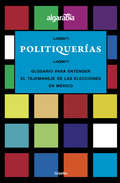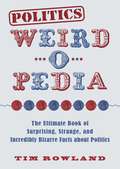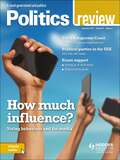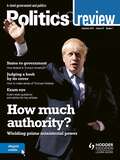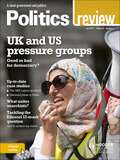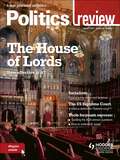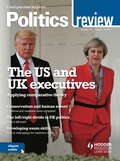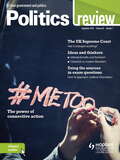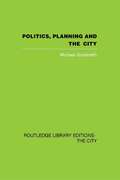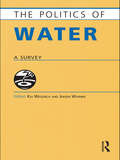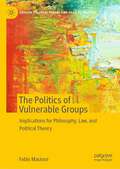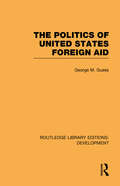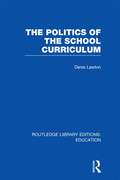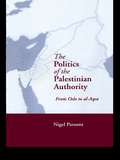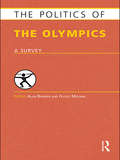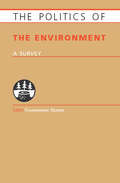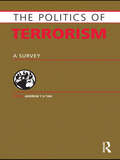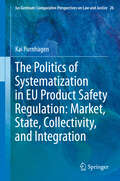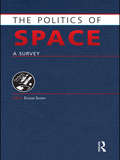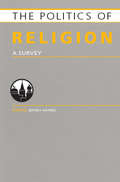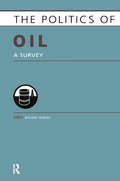- Table View
- List View
Polity and Constitution Part-4 - IAS Competitive Exam
by Vision IasUpdated Value Additional Material for 2020 IAS examination on the topic Polity and Constitution - Part 4
Polity and Constitution Part-3 - IAS Competitive Exam
by Vision IasUpdated Value Additional Material for 2020 IAS examination on the topic Polity and Constitution - Part 3.
Polity and Constitution Part-2 - IAS Competitive Exam
by Vision IasUpdated Value Additional Material for 2020 IAS examination on the topic Polity and Constitution - Part 2.
Polity and Constitution Part-1 - IAS Competitive Exam
by Vision IasUpdated Value Additional Material for 2020 IAS examination on topic Polity and Constitution Part 1.
Politiquerías: Glosario para entender el tejemaneje de las elecciones en México
by AlgarabíaPásele, sin temor ni aficiones encarnadas, a dar un recorrido al estrambótico y singular mundo del voto y el votado. Cada sexenio durante época de elecciones, o incluso cada día, nos encontramos con que los políticos de nuestro país nos ofrecen una gran cantidad de términos que a veces no entendemos y en otras ocasiones permanecen grabados en lo más profundo de la memoria. Las páginas venideras están llenas de triquiñuelas y felonías, en las que encontrará divertimentos y acepciones -cada una con su ejemplo de la vida real- de actos frecuentes en nuestro complejo sistema democrático. También disfrutará de datos curiosos sobre nuestros expresidentes, mandamientos para el «buen político», citas literarias, de personajes famosos y del pueblo; en fin, un amplio panorama de colores y tonos para entender -si esto es posible- un poco más del toma y daca, el tejemaneje y el estira y afloje de las elecciones en nuestra gran nación. Pásele, sin temor ni aficiones encarnadas, a dar un recorrido al estrambótico y singular mundo del voto y el votado.
Politics Weird-o-Pedia: The Ultimate Book of Surprising, Strange, and Incredibly Bizarre Facts about Politics
by Rowland TimGovernment and politics might seem twisted today, but they’ve always been strange.There’s something about public office that, throughout time, has transcended normalcy. Politics Weird-o-Pedia presents some of the oddest and most interesting political absurdities and tidbits from around the world, from Peter the Great’s tax on beards to a lawmaker’s mistress whom he kept on the congressional payroll despite her admission that “I can't type, I can't file, I can't even answer the phone.” Eminences include: Some of America’s Founding Fathers wanted to jail newspaper reporters. A Mongolian conqueror liked to build cement walls out of the bodies of his vanquished opponents (while they were still alive). An all-female resistance to nuclear missiles in Britain resulted in a protest that lasted for nineteen years—long after the missiles were gone. Politics Weird-o-Pedia doesn’t stand still for a minute. It is intriguing, funny, and occasionally startling. It is more than a collection of trivia, adding bits of context and historical vignettes that make it clear that no matter how dysfunctional politics and government might seem today—we’ve been through it all many times before.
Politics Review Magazine Volume 29, 2019/20 Issue 2
by Philip Allan MagazinesContents: Ten years of the UK Supreme Court Maria EganIdeas and thinkers: Ayn Rand and American conservatism Steve DaviesWhy do US political parties still matter? Simon LemieuxExam eye: How polarised are US political parties? Chris WilkinsonGlobal governance and the environment Josie GadsbyThe UK Supreme Court: key cases David TuckExam success: How to write an A* essay in AQA exams Emma KilheeneyThe media and voting behaviour Rowena HammalDebate: Is nationalism defined by race? Moyra Grant and Paul FloydCase study: The role and power of the Scottish Parliament Clare StansfieldComparing UK and US pressure groups Mike DawkinsExam eye: Comparing UK and US pressure groups Katie ShapiroExam success: Edexcel study guide Paul FloydFocus on... Multiculturalism Richard Kelly
Politics Review Magazine Volume 29, 2019/20 Issue 1
by Hodder Education MagazinesWhat determines the prime minister's power? Toby CooperExam eye: What determines the prime minister's power? Ben FullerThe complexities of human rights John JefferiesExam success: Comparative politics and theoretical approaches Simon LemieuxAre referendums the best form of democracy? Nick GallopLeviathan by Thomas HobbesDavid TuckIdeas and thinkers: Liberalism and natural rights Jessica HardyExam eye: Liberalism and natural rights Maria EganHow federal is Trump's America? Anthony J. BennettDebate: Who should make the law - judges or elected representatives? Louis Sugden and Matt WalkerComparative politics: Congress vs Parliament Andrew MilfordExam eye: Congress vs Parliament Nick AxonCase study: The US Supreme Court: too powerful and too political? Emma KilheeneyFocus on...: The three strands of ecology David Tuck
Politics Review Magazine Volume 28, 2018/19 Issue 4
by Hodder Education MagazinesContents President Trump at half-time: how is he doing?Robert SinghUK pressure groups and democracyAdam TomesDebate Is the United Nations unfit for purpose and in need of reform?Josie Gadsby and Rob MurphyComparative politics: campaign finance in the USA and UKSimon LemieuxThe legitimacy of the EUDavid TuckCase study Devolution in Wales: an insider's guide to devolved powersTim ErasmusAnarchism: unity within diversity?Simon LemieuxElections The 1997 general election: why was Labour's win so big?Laurie Huggett-WildeUS pressure groups: what is their impact on the democratic process?Andrew ColcloughIdeas and thinkers The nationalism of Marcus GarveyPaul FloydExam success Edexcel A-level Politics: tackling the 12-mark questionJohn JefferiesFocus on... The rise of populismNick Gallop
Politics Review Magazine Volume 28, 2018/19 Issue 3
by Hodder Education MagazinesContents Is there a distinctive 'Roberts court'? Toby CooperExam eye Is there a distinctive 'Roberts court'?Emma KilheeneyExam success How to write an A* essaySarra JenkinsThe House of Lords todayPhilip NortonDebate Is the era of bipartisanship in the USA over?Anthony J. Bennett and Simon LemieuxThe 2018 mid-term electionsSimon LemieuxSocialismMoyra GrantStretch and challenge Voting behaviour: how do voters decide in elections?Matthew QvortrupIs US hegemony under threat?Josie GadsbyExam success AQA A-level Politics: tackling the extract questionNick AxonComparative politics: civil rights in the UK and USAMike DawkinsFocus on The future of the nation-stateLaurie Huggett-Wilde
Politics Review Magazine Volume 28, 2018/19 Issue 2
by Hodder Education MagazinesUK party politics: the return of the left/right divide?Andrew HeywoodExam eyeUK party politicsEmma KilheeneyIdeas and thinkersConservative views on human natureDavid TuckComparative politics: UK and US judiciaries comparedToby CooperStretch and challengePolitics and God: why politicians need to be religiously literateMark GoodmanSelect committeesMark ChestertonThe US Congress: how effective is it?Edward AshbeeExam successExamination skills: an essential guideJessica HardyComparative politics: UK and US executives comparedLouis SugdenDebateDoes economic globalisation create prosperity for all?John Jefferies and Shaun TownsendThe UK constitution: how successful have recent reforms been?Andrew MilfordFocus on...Direct actionRowena Hammal
Politics Review Magazine Volume 28, 2018/19 Issue 1
by Hodder Education MagazinesThis A-level politics magazine provides up-to-date articles specially written for students to help them gain their highest grade. As well as articles covering UK, US and global politics, there is coverage of political ideas and thinkers, and advice on approaching different exam questions including structuring essays.ContentsThe UK Supreme Court: has it changed anything? Katie Shapiro Exam success AQA A-level Politics: tackling the 9-mark questions Emma Kilheeney Ideas and thinkers Intersectionality and feminism Maria Egan First past the post: is it still fit for purpose? Matt Walker English local elections 2018: a cautious stalemate? Rob Murphy Does the US Constitution still work? Anthony J. Bennett Exam eye Does the US Constitution still work? Emma Kilheeney Ideas and thinkers Classical vs modern liberalism David Tuck Debate Has Donald Trump restored the imperial presidency? Kay Moxon and Clare Stansfield Comparative politics: political parties in the UK and USA Simon Lemieux Exam success Edexcel and AQA A-level Politics: using the sources Sarra Jenkins Focus on... #MeToo Rowena Hammal
Politics, Planning and the City
by Michael GoldsmithPolitics, Planning and the City is designed to introduce the complex political processes and problems of the modern city. The author begins by setting the theoretical context and discusses models of democracy, power and the nature of policy. Next he examines change and the city, by focusing on actual decision-making. Three major policy areas affecting the city - housing, planning and the social services - are then reviewed and the post-war experiences analysed. The author concludes by discussing the consequences, intended and unintended, for the city adn asks whether city governments can cope with the future. This book was first published in 1980.
The Politics of Water: A Survey
by Kai WegerichThis authoritative reference work gives timely information on the global politics of water. Readers will find case studies on a variety of complex water situations, from the Okavango River that flows through Angola, Namibia and Botswana, to the Euphrates-Tigris of the Upper Persian Gulf. With the current threat of climate change and increasing demand on water resources, the book gives valuable insight into an increasingly politicized topic. Politics of Water is a welcome addition to Routledge’s extensive The Politics of … reference series. Readers will benefit from: essays on major topics in water politics from a variety of contributors (thirteen in all), including Is water politics? Towards international water relations and The politics of water and mining in South Africa sensitive debate on gender issues, reflecting the fact that in many cultures men are responsible for the supply of water, and women as cultivators and house keepers are the major users an A-Z glossary of key terms, issues, organizations, etc. in water politics information on selected major river basins of the world, including maps detailing water consumption and resources. The Politics of Water is a useful guide to the politics surrounding the availability and provision of water on a world-wide scale. It will prove to be a useful reference source for anyone interested in, or studying, the politics of water and climate change.
The Politics of Vulnerable Groups: Implications for Philosophy, Law, and Political Theory (Critical Political Theory and Radical Practice)
by Fabio MacioceThis book describes and analyzes the conceptual ambiguity of vulnerability, in an effort to understand its particular applications for legal and political protection when relating to groups. Group vulnerability has become a common concept within legal and political scholarship but remains largely undertheorized as a phenomenon itself. At the same time, in academia and within legal circles, vulnerability is primarily understood as a phenomenon affecting individuals, and the attempts to identify vulnerable groups are discredited as essentialist and stereotypical. In contrast, this book demonstrates that a conception of group vulnerability is not only theoretically possible, but also politically and legally necessary. Two conceptions of group vulnerability are discussed: one focuses on systemic violence or oppression directed toward several individuals, while another requires a common positioning of individuals within a given context that conditions their agency, ability to cope with risks and uncertainties, and manage their consequences. By comparing these two definitions of group vulnerability and their implications, Macioce seeks a more precise delineation of the theoretical boundaries of the concept of group vulnerability.
The Politics of United States Foreign Aid (Routledge Library Editions: Development)
by George M. GuessFirst published in 1987, this reissue explores contemporary United States foreign aid policies and thinking in the Reagan era. The author argues that aid policy is often confused as a result of bureaucratic decision-making processes. The book contrasts the experience of the many countries where aid-giving has produced unwished-for effects with the few countries where the desired results have occurred. The author concludes by arguing for a new approach to aid-giving by the United States.
The Politics of the School Curriculum (Routledge Library Editions: Education)
by Denis LawtonIf the curriculum can be defined as a ‘selection from the culture of society’, the central question then becomes ‘who selects’. This volume answers this question, reviewing various aspects of the curriculum and its planning. For many years the control of the curriculum was uncontroversial. In the 1970s this situation changed: teachers were increasingly criticised for having too much power; the Department of Education was suspected of wanting more control and local education authorities felt they should be more involved in curriculum planning. In reviewing some of the reasons for these conflicting pressures, two central themes emerge: first, the change from a partnership model of control to a complex system of accountability; and second the fact that these and many other changes which occur tend to be brought about as a result of secret decisions and central manipulation rather than through open negotiation. Among the areas covered are the changing position of teachers and the Department of Education, the influence of examinations on the curriculum, and some political aspects of curriculum evaluation and the different models used.
The Politics of the Palestinian Authority: From Oslo to Al-Aqsa
by Nigel ParsonsThis book explores the development of the Palestinian Liberation Organization (PLO) from a liberation movement to a national authority, the Palestinian National Authority (PNA). Based on intensive fieldwork in the West Bank, Gaza and Cairo, Nigel Parsons analyzes Palestinian internal politics and their institutional-building by looking at the development of the PLO. Drawing on interviews with leading figures in the PLO and the Palestinian Authority, delegates to the negotiations with Israel, and the Palestinian political opposition, it is a timely account of the Israel/Palestine conflict from a Palestinian political perspective.
The Politics of the Olympics: A Survey
by Alan BairnerWith the ever increasing global significance of the Olympic Games, it has never been more topical to address the political issues that surround, influence and emanate from this quadrennial sporting mega event. In terms of the most recent evidence of the politics of the Olympics, the 2008 Beijing Games were riddled with political messages and content from the outset, and provided a global stage for protesters with numerous agendas. These included, to name but a few, proposed boycotts, potential terrorist attacks, the question of open media access, protests against China’s political practices and attempts to interrupt the ‘traditional’ torch rally. Essays in this collection focus on numerous political aspects of the Olympics from a variety of different perspectives, with a Glossary that contains a range of politically relevant entries relating to famous and infamous Olympic athletes, Olympic movement personnel and events and broader political issues and developments which have affected the modern Games. The purpose of this anthology is not to perpetuate hatred towards the concept and practices of Olympism or to regurgitate a ‘celebratory party line’. Instead, in addition to being informative, the book offers critical engagement with the Olympics by raising awareness of the movement’s political significance. Consequently, the essays in this anthology illustrate the strong but changing links between the modern Olympic Games and politics, in general, and address and discuss the key political aspects and issues with regard to the Games themselves, to national and international sport organisations and to specific countries’ attitudes to (ab)using the idea/ideal of the Olympics for their own political ends.
Politics of the Environment: A Survey
by Chukwumerije OkerekeThe environment is increasingly seen at the forefront of many political agendas. Covering important topics, such as the Kyoto protocol and deforestation, this book provides extensive coverage of all aspects of environmental politics. Essays of around 6,000 words in length make up the bulk of the book. Written by notable experts in the field of environmental politics, these essays each examine a different aspect of the subject.
Politics of Terrorism: A Survey
by Andrew T H TanTerrorism is increasingly at the forefront of political agendas. Events world-wide have led to an increased awareness and response to this global phenomenon. The focus of this volume is on examining the fundamental causes of alienation and rebellion that underlie the use of terrorism as an instrument of violence. This title includes: essays, each of around 8,000 words in length, providing in-depth analysis of topics of relevance in the subject an A-Z glossary of key terrorist groups and organizations, as well as major terrorist incidences and events detailed maps and statistics an extensive bibliography listing further relevant reading material. This unique combination of analytically detailed essays with statistics and a glossary make this title a unique one-stop reference source as well as a training and education guide on the politics of terrorism world-wide.
The Politics of Systematization in EU Product Safety Regulation: Market, State, Collectivity, and Integration
by Kai PurnhagenThis book examines the increasing role of the legal method of systematisation in European Union (EU) law. It argues that the legal method of systematisation that has been developed in a welfare-state context is increasingly used as a regulative tool to functionally integrate the market. The book uses the example of EU product regulation as a reference to illustrate the impact of systematisation on EU law. It draws conclusions from this phenomenon and redefines the current place and origin of systematisation in the EU legal system. It puts forward and demonstrates two main arguments. First, in certain sectors such as in EU product safety law, the quality of EU law changes from a sector-specific and reactive field of law to an increasingly coherent legal system at European level. Therefore, instead of punctual market intervention, it increasingly governs whole market areas. By doing so, it challenges and often fully replaces the respective welfare-based legal systems in the Member States for the benefit of the ideal of a market-driven EU legal system. Second, at European level, the ideal is in development. This illustrates the change of the function of Statecraft from nation-states to market-states.
The Politics of Space: A Survey
by Eligar SadehThe pace of space exploration has long been dictated by political motivations. This book helps to explain why this is so in the post-Cold War era. Combining essays, a glossary of terms, tables and statistics, this new title from Routledge comes as a welcome addition to this increasingly popular topic. The book: covers theories and concepts, as well as current issues gives a background to international and national space agencies contains essays that cover military, commercial and governmental actors in space politics.
Politics of Religion: A Survey
This title explores some of the key issues which surround the politics of religion, an area which has historically been the cause of great controversy. Today religion is still the cause of a great deal of political debate, be it the teaching of the creationist theory in the United States or the relationship of church and state in Arabic countries. Four sections present a thorough overview of the politics of religion in historical perspective: Essay chapters written by a variety of academic and other experts on the major world religions and their relationship with politics, and on topics including religious fundamentalism, church and state and religious terrorism, providing background analysis of the links between religion and politics. A – Z glossary of religions, religious groups, ideas and issues, including entries on Agnosticism, Bradford Council of Mosques, Muslim Brotherhood, Nirvana, the World Council of Churches, etc. Entries are up-to-date and cross referenced for ease of use, and symbols at the end of each entry denote to which major religion(s) the entry refers. Maps for reference, showing adherents to major religions worldwide, adherents to religions in the Middle East, and adherents to the major sub-types of Christianity. This title offers up-to-date and unbiased information that will provide a wealth of information to students, academics, business people and general researchers.
Politics of Oil: A Survey
by Bülent GökayThis new title presents key information on the oil industry world-wide, and will be of interest to anyone involved in or studying the politics of oil production, processing and selling. Oil has long been at the forefront of political agendas, and with increased tensions in the Middle East, there has never been a greater need for up-to-date, reliable information on this key industry. Includes: * essays covering the main themes * an A-Z glossary listing important terms * detailed maps * a statistics section.

